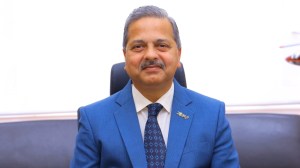War’s your trump card, tips on how to play
If they play their cards right, both Prime Minister A B Vajpayee and President Pervez Musharraf will come out winners in the current militar...

If they play their cards right, both Prime Minister A B Vajpayee and President Pervez Musharraf will come out winners in the current military standoff over Kashmir. The losers will be the fundamentalist terrorist groups seeking to provoke a full-scale war between India and Pakistan, which would be disastrous for both countries.
Whatever their past connection to the Pakistani government, the Kashmiri Jihadists have their own agenda. They seek to provoke a war to undermine Musharraf’s secularisation campaign in Pakistan, destroy Islamabad’s new alliance with Washington, and relieve pressure on their Al-Qaeda allies hiding out in the North-West territories.
|
Samore
and Chipman |
India’s trump card is the threat of war, but it must be played carefully and in conjunction with other cards in the deck.
Musharraf has a strong interest in trying to prevent additional terrorist operations in Kashmir (or India) that spark a broader war with India’s superior conventional forces. He will equally argue, as others have in similar circumstances, that he does not have total control over all terrorists in the area. Islamabad brandishes the nuclear threat to deter an Indian attack, but Pak officials are aware that if forced to use nuclear weapons, India will retaliate, with devastating consequences for both countries.
To strengthen his hand with Washington and London, Musharraf will warn that he cannot co-operate with the campaign to mop up the remnants of Al-Qaeda unless Indian pressure on his flanks is relieved. India’s challenge now is two-fold.
First, in the near term, Delhi needs to avoid overplaying its hand by relying on one card. The threat of war has been effective in creating pressure on Islamabad, but the execution of this threat would be extremely dangerous and self-defeating.
If India launches an attack across the international border that breaks though Pakistan’s lines and threatens to capture key cities, such as Lahore, Pakistan could threaten the use of nuclear weapons to halt the Indian attack. Will Delhi halt the offensive in the face of this threat or press ahead, running the risk that Pakistan will be forced to resort to nuclear weapons, perhaps in the first instance, against Indian troop concentrations and military bases? The danger is particularly acute because militant groups operating independently of Pakistani government control may seek to mount a terrorist operation to force India to make good on its threat to attack Pakistan.
The second and longer-term challenge for India is to find a way out of the current cycle of tensions with Pakistan that begins a process to improve Indo-Pakistan relations and ultimately achieve peace in Kashmir.
India’s threats have been effective, but inducements are also required. To facilitate American and British efforts to convince Musharraf to crack down on Kashmiri militants, India needs to make clear that it is prepared to de-mobilise its forces and to address the Kashmir dispute, once Pakistan has begun to meet Indian concerns.
The difficulty, of course, is setting a realistic standard for Pakistani actions to meet Indian demands. Musharraf has his own reason to crack down on Kashmiri terrorists, but he can at best only re-shape, not end, Islamabad’s political support for the Kashmiri cause.
In any case, even if Pakistan effectively ended cross-border support for the insurgency, some level of indigenous Kashmiri insurgency would continue in the medium term. For Pakistan to re-shape its support, India needs to consider a new vocabulary in pursuit of a political solution in Kashmir. It could loftily acknowledge that the problem in Kashmir is ‘‘one of people as well as of territory.’’
Adopting that phrase could give India greater diplomatic control over any ultimate process. India could then commit itself to ensuring, as the situation on the ground permitted, that the September elections in Kashmir were free and fair. The ultimate goal would then become the establishment of acceptable domestic political arrangements between Delhi and Srinagar.
Inevitably for both countries, keys to the solution lie in Washington. In effect, both Pakistan and India are appealing to the US to solve their respective problems. Pakistan looks to the US to prevent a war with India and mediate a solution of the Kashmir dispute.
Since the 1999 Kargil crisis, India has looked to the US to pressure Pakistan to end support for the Kashmiri insurrection. Despite their fundamental differences over Kashmir, both Delhi and Islamabad share an interest in preventing additional terrorist attacks that threaten to cause a full-scale war that neither side would win, and both sides are counting on Washington to step in and defuse the crisis.
Washington treasures its developing political/security relationship with New Delhi, is annoyed that the rate of terrorist infiltration into Indian-occupied Kashmir continues, but relies on Pakistan for elements of its wider war on terrorism. The US will want to avoid being drawn into a South Asian conflict when so many other fronts are beckoning.
The risk for Washington is to discover itself mediating another fifty year-old dispute and intervening in another country’s fight against local terrorists. It can manage that risk by forcefully explaining to Musharraf that he can buy the prospect of a political process on Kashmir in only one currency: the elimination of terrorism emanating from Pakistan. For that, Washington needs to know that India would begin a political process once its concerns have been compellingly addressed.
The risk for Pakistan, or more precisely Musharraf, is to be seen as a puppet of both Washington and India. He can manage that risk by explaining, as he did when the Taliban were abandoned, that national interests demand a change in tactic, and that rounding up the Kashmiri terrorists is part of the larger effort he earlier announced in favour of modernising Pakistan. To do that, he needs an open acceptance by India that a political dialogue on Kashmir cannot forever be kept on the back burner, while other, ’easier’ Indo-Pakistan issues are dealt with.
The risk for India in its dramatic military mobilisation is to create what it has sought so long to avoid: the internationalisation of the Kashmir dispute. Of all three countries, India is most able to mitigate alone the risk it faces.
To avoid the dilemma of internationalisation, while managing the risks of the other parties, India will need to design, and then hold out, a diplomatic card that depicts the process of a dialogue with Pakistan on Kashmir. Bringing that card alongside its trump card, sometime over the next few months, may just keep India in control of this dangerous game.
Chipman is Director of The International Institute for Strategic Studies (IISS), in London; Gary Samore is Senior Fellow for Non-Proliferation at IISS and former Senior Director at the US National Security Council.


- 01
- 02
- 03
- 04
- 05





























